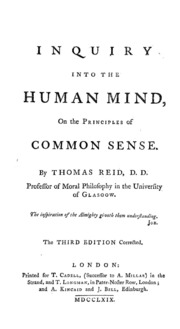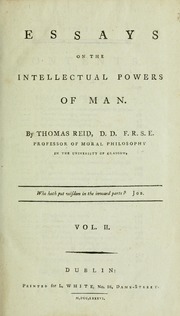Thomas Reid on "Common Sense" (Part Three)
 Thursday, August 9, 2018 at 12:30PM
Thursday, August 9, 2018 at 12:30PM Reid on “Common Sense” For Reid, first principles and common sense are closely related. In Essays on the Intellectual Powers of Man, Reid writes, “first principles, principles of common sense, common notions, [or] self-evident truths” are “no sooner understood than they are believed. The judgment follows the apprehension of them necessarily, and both are equally the work of nature, and the result of our original powers” (Reid, Intellectual Powers, in Works of, 1:452). Previously, Reid identified common sense as “necessary to all men for their being and preservation, and therefore it is unconditionally given to all men by the Author of Nature” (Reid, Intellectual Powers, in Works of, 1:412).
For Reid, first principles and common sense are closely related. In Essays on the Intellectual Powers of Man, Reid writes, “first principles, principles of common sense, common notions, [or] self-evident truths” are “no sooner understood than they are believed. The judgment follows the apprehension of them necessarily, and both are equally the work of nature, and the result of our original powers” (Reid, Intellectual Powers, in Works of, 1:452). Previously, Reid identified common sense as “necessary to all men for their being and preservation, and therefore it is unconditionally given to all men by the Author of Nature” (Reid, Intellectual Powers, in Works of, 1:412).
More specifically, common sense refers to “the consent of ages and nations, of the learned and unlearned, [which] ought to have great authority with regard to first principles, where every man is a competent judge” (Reid, Intellectual Powers, in Works of, 1:464). Such principles are identified as common sense because they are common to humanity and held by all people across time and cultures. Reid grounds his belief in common sense in an empirically justified generalization that this is the necessary state of affairs for humans to know anything–especially that the external world exists. To put it simply; this is “common sense” because it is demonstrably common to all of humanity. If all people see an object, and then universally assign the same qualities to that object, without any prior explanation or self-reflection required before doing so, this can only because their knowledge of that object is “true.” All people instinctively think this way, unless convinced to doubt this knowledge by teachers of the ideal theory.
While Reid argued common sense was virtually self-evident because universal (in this regard, Reid is a foundationalist of a sort), his critics then and now, attacked him at this very point by claiming his common sense philosophy was nothing more than an appeal to majority opinion–the “wisdom of the vulgar.” If true, this chips away at the very idea of the supposed universality of Reid’s first principles. If common sense is really nothing but popular opinion verified by counting noses, and by observing how the uneducated rabble make decisions, then such first principles amount to nothing of value in settling truth claims. No philosopher worthy of the name would dare make such an appeal.  But Reid anticipated this line of criticism and as a good Newtonian, made clear that his first principles were actually empirical and psychological observations, reflecting the way people actually think and interact with the world around them. To give this point some teeth, at several places, Reid appeals to universal elements in the structure of human language (anticipating the later work of G. E. Moore and J. L. Austin). Reid points out that all human language is built upon a distinction between the active and passive voice, and that all languages distinguish between the qualities of things, and the things themselves. This goes a long way toward making Reid’s point.
But Reid anticipated this line of criticism and as a good Newtonian, made clear that his first principles were actually empirical and psychological observations, reflecting the way people actually think and interact with the world around them. To give this point some teeth, at several places, Reid appeals to universal elements in the structure of human language (anticipating the later work of G. E. Moore and J. L. Austin). Reid points out that all human language is built upon a distinction between the active and passive voice, and that all languages distinguish between the qualities of things, and the things themselves. This goes a long way toward making Reid’s point.
To put it another way, Reid’s first principles are not true because most people accept them. Nor are they true because this is how the common man or woman expresses themselves when asked about how they know what they know. Rather, people think and interact with the world as they do, precisely because this is how their creator has made them to think and act. Reid, to my knowledge does not refer to the “divine image” while discussing these common sense capabilities–although he does speak of the divine image in humanity when discussing moral liberty, and conscience (Reid, Active Powers of Man, in Works of, II.564, 585, 615). But are not the abilities given us by our creator something akin to humans reflecting the image of their creator? We are born with the capacity to utilize these first principles without any self-reflection, or without being able to give any reasons for doing so. This is how God made us, and is his way of enabling and equipping his creatures to live in the world which he has made.


Reader Comments